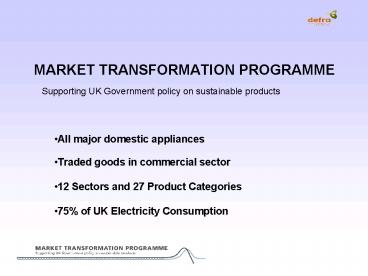MARKET TRANSFORMATION PROGRAMME - PowerPoint PPT Presentation
1 / 12
Title:
MARKET TRANSFORMATION PROGRAMME
Description:
Service cabinets. Cold Rooms (walk in) Cellar cooling equipment. Ice-making machines ... Expansion of the scheme (display cabinets) EuP Directive. ... – PowerPoint PPT presentation
Number of Views:70
Avg rating:3.0/5.0
Title: MARKET TRANSFORMATION PROGRAMME
1
MARKET TRANSFORMATION PROGRAMME
Supporting UK Government policy on sustainable
products
- All major domestic appliances
- Traded goods in commercial sector
- 12 Sectors and 27 Product Categories
- 75 of UK Electricity Consumption
2
MTP Operating characteristics
- Collecting information. Stock, sales, usage and
consumption data on different product categories
that use large amount of energy and water. - Building evidence base. Collected information is
used to model future consumption projections.
Three scenarios Reference Policy
EBP (Earliest Best Practice) - Reference scenario existing market trends and
adopted policy measures. - Policy scenario impact of proposed/future
feasible policy measures. - EBP if market is to take up the most effective
option. - Policy actions. Identifying specific policy
actions required to achieve particular product
scenarios (Ref, P, EBP). - Working with industry and other stakeholders.
Evidence base and policy actions developed by
consensus involving all stakeholders to improve
its robustness, promote the policy measures and
obtain feedback.
3
Product Area Overview
Cross Sector
Domestic
Non-Domestic
Water
Office Equipment
Cold Appliances
Consumer Electronics and ICT
Commercial Refrigeration
Cooking
Wet
Air Conditioning
Lighting
Heating
Electric Motors
4
Commercial Refrigeration Product Area
- Products currently covered.
- Liquid chillers.
- Integral refrigerated display cases
- Remote refrigerated display cases
- Service cabinets
- Cold Rooms (walk in)
- Cellar cooling equipment
- Ice-making machines
- Refrigerated vending machines
- Products for possible future introduction
- Minibars
- Refrigerated transport
5
Energy consumption projectionsSummary table
6
Remote Display Cabinets
7
Process Chillers
8
All Commercial Refrigeration
9
Main Policy Actions
- Enhanced Capital Allowance Scheme.
- Financial incentives (100 first year
capital allowance) available for products on the
Energy Technology List. Encourage end users to
buy and suppliers/ manufacturers to design energy
efficient products. - gtgtgt Estimated energy savings (Refrigeration) gtgtgt
1.4 TWh (2004/5) - - Technology Review currently being
undertaken - Display cabinets Service cabinets
Liquid chillers - Possible introduction of new thresholds and
extension of product ranges. - - Possible future introduction of new products
- (e.g. vending machines, clod rooms)
Eurovent Energy Efficiency Classification.
Voluntary classification for chillers that
classifies products from Eurovent
Class A" to Eurovent Class G". gtgtgt
(5 Class A / 7 Class G) Classes displayed in
Eurovent Directory of Certified products.
Future steps to consider - Remove the least
efficient products
- Expansion of the scheme (display cabinets)
10
- EuP Directive.
- Eco design requirements to address environmental
effects of energy using products through the
whole life cycle. Products must meet the set
criteria in order to be placed on the market. - - Fourteen preparatory studies underway
- (Preparatory Study Group 12 BIO Intelligent
Services) - gtProduct Specific Directive for commercial
refrigerators and freezerslt - Output eligibility criteria, eco design
criteria, performance criteria. - 1. Eligibility criteria which product
categories will be included (main candidates
liquid chillers, retail cabinets, vending
machines). - 2. Eco design criteria sets the requirements
for the whole life cycle (consumed raw material,
packaging, transport, operation/energy use,
disposal) - 3. Performance criteria analyse/recommend
minimum performance thresholds for the proposed
product categories. - Timescale Study completed (July 2007) Adopted
by Commission (2008)
11
Quick Win Central Government departments
must apply minimum environmental
standards when purchasing certain types of
products. 27 product categories
currently on the list. Expansion of the list is
being considered and mechanism is developed to
promote products from candidate to fully
accepted Refrigeration products on the
list - display cabinets - cellar cooling -
air cooled condensers - thermal screens
12
- Minimum Standards
- Discourage/eliminate production of the worst
performing products. - Currently not adopted in UK refrigeration sector
- gtgtgt Two main standards for possible future
consideration gtgtgt - MEPS (Minimum Energy Performance Standard)
- Product must exceed the minimum threshold.
- Product with energy efficiency below the
threshold are taken off the market - (Adopted in Australia, Canada, USA)
- Top Runner Standard
- Weighted average must exceed the target
threshold. - Targets set based on top performing products.
Products below the target can be sold provided
that proportional quantity of higher efficiency
products is also sold, so that the overall
weighted average is above the target. - (Introduced in Japan)































